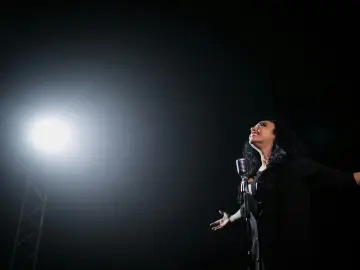It’s a question that people keep typing into Google every month, quietly, almost sheepishly: can anyone learn to sing?
Beneath that question is usually a personal story — someone who was told as a child that they couldn’t sing, or someone who sat through a humiliating school performance, or a person who never dared to join in at karaoke because they were convinced they were tone-deaf. It’s not just a technical query. It’s about permission. The permission to try again. To unlearn the idea that singing is something you either have or you don’t.
The short answer is: yes, you can learn to sing. But the longer, more interesting answer is about why so many of us believe we can’t — and what it takes to change that.
- The myth of the born singer
- What the science says about singing
- Why we stop singing
- What learning to sing actually looks like
- Ordinary people, extraordinary results
- So, can anyone learn to sing?
- Try our singing course for free
The myth of the born singer
 Popular culture has always been obsessed with natural talent. From televised talent shows to biopics of child prodigies, we love the idea of singers being born rather than made. It’s cleaner that way. It feeds the narrative that greatness is something mysterious, almost magical, and not the product of years of hard, often awkward, practice.
Popular culture has always been obsessed with natural talent. From televised talent shows to biopics of child prodigies, we love the idea of singers being born rather than made. It’s cleaner that way. It feeds the narrative that greatness is something mysterious, almost magical, and not the product of years of hard, often awkward, practice.
But when you start digging a little deeper, that myth begins to fall apart. Consider the stories of some of music’s biggest names:
Elvis Presley was told by his music teacher that he had no singing ability and scored a ‘C’ in the class.
Shakira was asked to leave her school choir because she apparently sounded “like a goat.”
Colbie Caillat didn’t make it past the first round of American Idol — not once, but twice — and later became a global star by uploading her music to MySpace.
What all of these artists have in common is not natural brilliance from the beginning, but the resilience to ignore the early dismissals. That’s the part we don’t hear enough about. Most successful singers weren’t perfect to begin with — they just didn’t stop.
What the science says about singing
 If the idea of “natural talent” feels discouraging, science offers a far more hopeful perspective. A study from Southern Cross University found that only around 1.5% of the population is truly tone-deaf — meaning they are physically unable to detect differences in pitch. That leaves the remaining 98.5% of us with the capacity to hear pitch and, with the right training, learn to reproduce it accurately.
If the idea of “natural talent” feels discouraging, science offers a far more hopeful perspective. A study from Southern Cross University found that only around 1.5% of the population is truly tone-deaf — meaning they are physically unable to detect differences in pitch. That leaves the remaining 98.5% of us with the capacity to hear pitch and, with the right training, learn to reproduce it accurately.
Further research has shown that singing is a complex interaction between the brain, the ears, and the vocal apparatus — but more importantly, it’s a skill that improves with practice. Just like you can train your body to run further or your fingers to play piano, you can train your voice to become more accurate, more controlled, and more expressive.
People often think singing is about having “a good voice,” but in reality, it’s about learning to control what you already have. And for most people, that control can be developed far more than they ever believed.
💡 ARTMASTER TIP: If you are interested about the current research into the health benefits of learning music, take a look at our guides:
➡️How learning music benefits the brain and body
➡️Can playing music help you live longer and healthier?
➡️Why learning music is one of the best things your child can do
Why we stop singing
 Most people don’t stop singing because they physically can’t do it — they stop because someone made them feel like they weren’t allowed to. Sometimes it’s a music teacher who tells a child to mime in the school choir. Sometimes it’s a throwaway comment from a friend or a parent. Whatever the source, that shame sinks in, and for many, it’s enough to shut them down for life.
Most people don’t stop singing because they physically can’t do it — they stop because someone made them feel like they weren’t allowed to. Sometimes it’s a music teacher who tells a child to mime in the school choir. Sometimes it’s a throwaway comment from a friend or a parent. Whatever the source, that shame sinks in, and for many, it’s enough to shut them down for life.
It’s unfortunate, because singing is one of the most human things we do. It predates written language. It connects us socially, emotionally, and physically. And yet somewhere along the way, it’s become something we outsource to professionals — something we listen to, rather than participate in.
But that doesn’t have to be the case. With the right mindset, and a bit of patience, singing can be reclaimed as something personal — even joyful — rather than performative.
💡 ARTMASTER TIP: These artists didn’t just prove the critics wrong — they found voices that were unmistakably their own. If you’re wondering how to do the same, here’s a step-by-step guide to developing your own unique singing style.
What learning to sing actually looks like
Learning to sing isn’t glamorous. It involves awkward recordings, vocal exercises that feel silly at first, and an acceptance that progress might be slow. But it’s also rewarding, confidence-boosting, and surprisingly accessible.
You don’t need to start as a child. You don’t need to hit five octaves. You just need to be willing to practise regularly, pay attention to your breath and pitch, and listen to your own voice without judgement. Tools like vocal coaches, online courses, and singing apps can help guide the process, but the most important ingredient is consistency.
One of the most common pieces of advice from singing teachers is simple: if you can speak, you can sing. The mechanism is the same — it’s just a matter of learning how to control and shape the sound.
💡 ARTMASTER TIP: A great place to start is with controlled breathing. And, it not only supports singing but can also reduce stress and promote relaxation. To learn more, check out our article on breathing techniques.
Ordinary people, extraordinary results
 On online forums, you’ll find hundreds of people sharing stories of their journey into singing — many of them starting with complete doubt in their own abilities. Some say they began by miming during songs, too afraid to be heard. A year later, after consistent daily practice, they were recording themselves or performing at open mics. These aren’t celebrities or professionals. They’re just people who decided to try.
On online forums, you’ll find hundreds of people sharing stories of their journey into singing — many of them starting with complete doubt in their own abilities. Some say they began by miming during songs, too afraid to be heard. A year later, after consistent daily practice, they were recording themselves or performing at open mics. These aren’t celebrities or professionals. They’re just people who decided to try.
And that’s really the core of the matter. Most of the limitations we think we have are mental. Once you push past the initial discomfort — the recordings that sound worse than you expected, the exercises that feel unnatural — your voice begins to settle. You begin to trust it.
And when that happens, singing goes from something terrifying to something freeing.
💡 ARTMASTER TIP: The difference wasn’t raw talent — it was consistent, focused practice. If you’re ready to build a singing habit that actually works, this guide to effective music practice is a great place to start.
So, can anyone learn to sing?
Yes — but more importantly, anyone can learn to enjoy singing. That’s the real goal. You don’t need to become a star or make an album. You just need to unlearn the idea that singing is reserved for the talented few.
If you’ve been thinking about giving it another try — quietly, privately, or even with the help of a teacher — do it. Don’t let the ghost of a music class from years ago stop you.
Your voice is probably better than you think. And if it’s not yet, that’s nothing a bit of practice can’t fix.
Try our singing course for free
If you’re ready to start singing but don’t know where to begin, Singing for Beginners is the perfect first step. Taught by Stevvi Alexander — a professional vocal coach and singer who’s performed with Justin Timberlake and Barbra Streisand — the course walks you through everything you need to build a strong, confident foundation. With clear, encouraging video lessons, Stevvi helps you develop essential skills like breath control, pitch, and tone, all at your own pace and in your own space.

